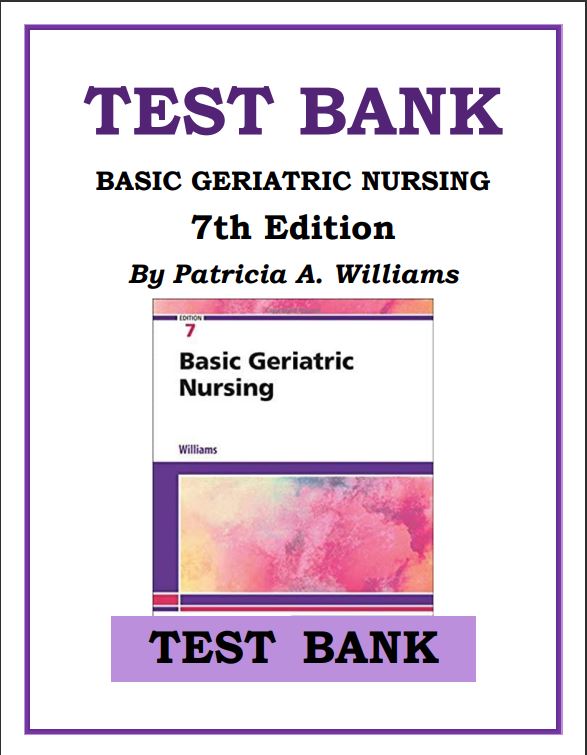BASIC GERIATRIC NURSING 7th Edition By Patricia A. Williams TEST BANK
BASIC GERIATRIC NURSING 7th Edition By Patricia A. Williams TEST BANK
Couldn't load pickup availability
What fact explains the shift of health care focus toward the older adult in the late 1960s?
a. Disability was viewed as unavoidable.
b. Complications from disease increased mortality.
c. Older adults’ needs are similar to those of all adults.
d. Preventive health care practices increased longevity.
ANS: D
2. To what age group does the term “aged” apply?
a. 55–64 years of age
b. 65–74 years of age
c. 75–84 years of age
d. 85 and older
ANS: C
3. Which is true of ageism?
a. It is discrimination against persons solely on the basis of age.
b. It causes a person to fear aging.
c. It involves the use of cultural sensitivity to address concerns of aging.
d. It focuses on resources for the older adult
ANS: A
4. What is the most beneficial legislation that has influenced health care for the older adult?
a. Medicare and Medicaid
b. Elimination of the mandatory retirement age
c. The Americans with Disabilities Act
d. The Drug Benefit Program
ANS: A
5. What housing option for the older adult offers the privacy of an apartment with
restaurant-style meals and some medical and personal care services?
a. Government-subsidized housing
b. Long-term care facility
c. Assisted-living center
d. Group housing plan
ANS: C
6. The 75-year-old man who has been hospitalized following a severe case of pneumonia is
concerned about his mounting hospital bill and asks if his Medicare coverage will pay for
his care. What would be the most helpful response by the nurse?
a. Medicare Part C pays 50% of all medical costs for persons older than 65.
Basic Geriatric Nursing 7th Edition Williams Test Bank
b. Medicare Part B pays hospital costs and physician fees.
c. Medicare Part A pays for inpatient hospital costs.
d. Medicare Part D pays 80% of the charges made by physicians.
ANS: C
7. The daughter of a patient who has been diagnosed with terminal cancer asks which
documents are required to allow her to make health care decisions for her parent. Which
response would provide the most accurate information to the daughter?
a. Advance directives indicate the degree of intervention desired by the patient.
b. A ‘Do Not Resuscitate’ document signed by the patient transfers authority to the
next of kin.
c. A durable power of attorney for health care transfers decision-making authority for
health care to a designated person.
d. A living will transfers authority to the physician.
ANS: C
8. The daughter of a resident in a long-term care facility is frustrated with her 80-year-old
mother’s refusal to eat. Which response would be the most appropriate?
a. The refusal to eat is an effort to maintain a portion of independence and
self-direction.
b. The refusal to eat is an indication of approaching Alzheimer disease.
c. The refusal to eat is an effort to gain attention.
d. The refusal to eat is an indication of the dislike of the institutional food.
ANS: A
9. When do the conditions of a living will go into effect?
a. When the patient declares that desire in writing
b. When a family member indicates the desire for curative therapy to cease
c. When two physicians agree in writing that the criteria in the living will have been
met
d. When the physician and a family member agree that the criteria in the living will
have been met
ANS: C
10. In the 1980s, Medicare initiated a program of diagnosis-related groups (DRGs) to reduce
hospital costs. How did the DRGs reduce hospital costs?
a. By classifying various diagnoses as ineligible for hospitalization
b. By allotting a set amount of hospital days and prospective payment on the basis of
the admitting diagnosis
c. By specifying particular physicians to treat specified diagnoses
d. By using frequency of a particular diagnosis to set a payment schedule
ANS: B
Share

